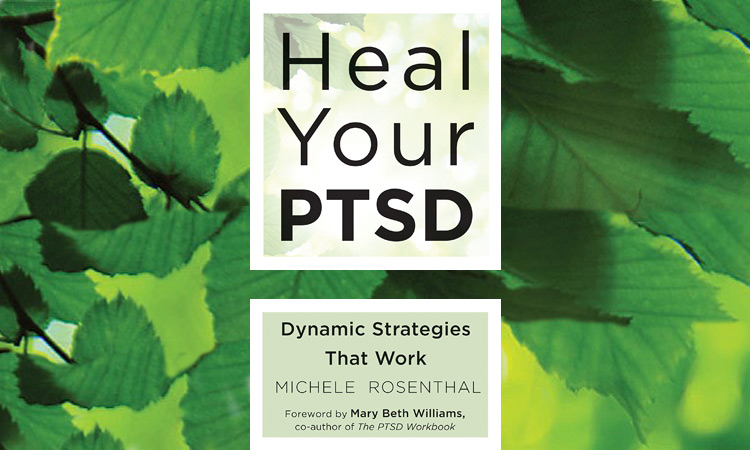 Many people who have experienced trauma are searching for that one quick solution that will take their pain away. The effects of PTSD can be crippling and the road to recovery can last years or even a lifetime. Michele Rosenthal, coach, speaker, author and friend of Rewire Me, struggled with undiagnosed PTSD for 25 years, so can relate to the devastating aftermath of trauma. It was only when she decided to abandon the victim mentality that the recovery process could begin. Through extensive research and taking a proactive approach, Michele discovered the tools to heal.
Many people who have experienced trauma are searching for that one quick solution that will take their pain away. The effects of PTSD can be crippling and the road to recovery can last years or even a lifetime. Michele Rosenthal, coach, speaker, author and friend of Rewire Me, struggled with undiagnosed PTSD for 25 years, so can relate to the devastating aftermath of trauma. It was only when she decided to abandon the victim mentality that the recovery process could begin. Through extensive research and taking a proactive approach, Michele discovered the tools to heal.
Her latest book, Heal Your PTSD: Dynamic Strategies That Work, shares what she learned, helping you not only move past your trauma, but also to fully heal and live a fulfilling life. Keeping in mind that PTSD recovery is not a one-size-fits-all approach, Michele offers a wide variety of strategies for readers to explore. Written in a relatable, conversational tone, it’s obvious she is rooting for you to succeed; making you feel like she is right there with you every step of the way on your healing journey.
Here is an excerpt on how to create your personal healing strategy:
Because you are unique, your healing time will be individual to your own journey.
A popular recovery query is, “If I’ve struggled for X years, is healing still possible for me?” Many times the answer is yes. How long it will take for you to heal cannot be predicted or judged based on the details or facts of anyone else’s process. Some survivors go from trauma to PTSD diagnosis to recovery in as little as six months. Others spend decades in the struggle before finding relief.
Factors that impact the length of recovery include your trauma history, willingness and readiness to engage and participate in the recovery process, plus feasibility (financial, physical, emotional), safe environment, and comfort level with the professionals, practices, modalities, and treatment approaches you utilize.
While the effects of trauma and PTSD become more embedded, the longer they remain untended, the brain’s willingness to change often opens the real possibility to reduce and even eliminate symptoms several years after their initial appearance.
Stop looking at others and focus on yourself. What conditions would help facilitate a consistent healing process for you? How can you create them?
Clarify, verify, strategize.
Clarity is being able to say, “I want . . . .” The more specifically and detailed you can fill in that blank, the more likely you will successfully devise a road map for healing.
When you verify something, you test its accuracy. Let’s say you clarify that you want A. Verifying that means making sure it’s true that you really do want that. Ask yourself, “Why do I want it?” If the answer feels right to you, then it’s full steam ahead. If you don’t have an answer or if the answer comes back, “Hey, I don’t really want that at all because . . . !” then you know it’s time to pull back and reassess.
When you strategize, you create an action plan. In this phase you’re asking yourself, “How am I going to do that?” This will be a multipart answer, as you will need to outline and then prioritize and then tweak several steps as you receive internal feedback along the way.
This is what the process of recovery is all about:
1. Know what you want.
2. Identify why you want it.
3. Outline the steps you need to take to get it.
Following those clues, you can move toward discovering your path to freedom.

Rose Caiola
Inspired. Rewired.
Reprinted with permission from Red Wheel/Weiser, LLC., Heal Your PTSD by Michele Rosenthal is available wherever books or ebooks are sold or directly from the publisher at 1-800-423-7087 or www.redwheelweiser.com.
Click here to get inspired by Rose’s easy steps to positively change your mind


2 Comments
frank Krick
I have lost two siblings real close together in a short time ,as well as a gun going off in a closed truck an then a fireworks display I was helping set off it blew up right in front of me like inches from my face .Ever sence then I have struggled to recovery I’m still having trouble with alot I need help .
Gianna Caiola
Hello Frank,
We thank you for sharing your story with us and we understand the struggle to deal with grief. It takes a strong person to admit when help is needed and there should never be any shame in admitting that. We suggest finding a local psychiatrist that can help you with this difficult time in your life. You can use this link to help you find a therapist, as well as reading about symptoms and treatment options here. You can also contact the author of this book, Michele Rosenthal, a Post-Trauma Coach, on her website.
We hope you find the peace you deserve.